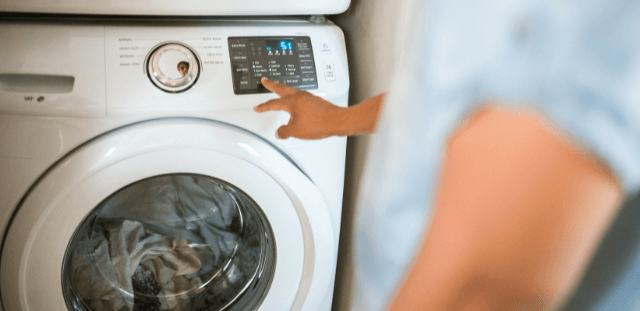Washing machines go through a lot of water in your home, especially if you have a lot of laundry. Unfortunately, this makes them a common culprit of water damage in laundry rooms and basements for many homeowners. One of the most vulnerable parts of a washing machine is the hose that either drains the water out of the machine or supplies the water for each load.
When these hoses fail, which is relatively common, the result could be high volumes of water spilling into your home. Preventing this potential scenario could save you thousands of dollars in water damage repairs.
Why Do Washing Machine Hoses Fail?
There are several reasons why washing machine hoses can fail. First, if they are not installed properly, they’re unlikely to last as long as they should. This is especially true if the water connection points are not secured. But even when these hoses are correctly installed, normal usage can result in wear and tear. If possible, washing machines should be at least four inches away from the hose connections to prevent crimping.
There is also a factor known as water hammer, which refers to a jerking motion that the hoses experience when the washing machine abruptly shuts off the water supply during use. Rust is another issue that can result in bad connections or compromised hoses if they are made from stainless steel. All these factors can result in washing machine hoses failing.
What Happens If a Washing Machine Hose Bursts?
The problem with washing machine hoses is that they have a constant water supply. That means water pressure is always pushing for water to enter the supply lines, and it’s only kept at bay because the valves are closed when the washing machine is not on.
Therefore, if these hoses burst, water will immediately start spilling into your home at a very high rate. The same pressure in your other faucets is also in the water supply hoses for your washing machine.
Structural elements, furniture, and other possessions can experience intense damage from this water, especially if you are not home to notice the problem quickly and shut off the water supply. A burst in the drain hose is not as dire unless the washing machine is running.
How to Prevent Washing Machine Hose Failures
This sounds like the kind of problem you want to avoid, right? Preventing washing machine hoses from failing is pretty simple. All it takes is a few consistent practices to ensure your hoses are working properly and are far from bursting.
Regularly Inspect Your Machine Hose
The first step in preventing the failure of your washing machine hoses is to inspect your washing machine regularly, at least once every three or four months. Traditional rubber hoses will often have blisters, bubbles, crimps, or cracks forming if they are under too much stress, which is an obvious sign that they should be replaced. Check for signs of rust on stainless steel braided hoses, especially at the connection points between the hoses and the machine.
Replace Rubber Washing Machine Hoses
Rubber hoses are common with older washing machine models. Often, this material is not strong enough to withstand constant use. Replacing washing machine hoses made from rubber tube materials with either reinforced rubber, copper alloy, or braided stainless steel hoses can help them last longer.
Check for Water Leaks
Leaks around your washing machine are an obvious indicator that something is wrong, and the problem could very well be the washing machine hoses. Often, leaks will occur if there are small cracks in the hoses or if the connection points are starting to wear down. If you ignore the leak, there is no telling when it could result in a complete burst that spills gallons of water into your home very quickly.
Invest in a Water Hammer Arrestor
The jerking motion that occurs whenever the water flow to the machine is shut off can accelerate the issues with your washing machine hoses. However, a water hammer arrestor can mitigate this jerking so that your hoses are under less physical stress and can last longer. Make sure you contact a professional to have this part installed so that it is done correctly.
What to Do If the Washing Machine Hose Fails
In case of a broken hose, reacting quickly is the key to saving your property and possessions. Since the water pressure is the same as with your faucets, failing to respond even for a few minutes could have devastating consequences for your home.
Shut the Water Supply Off
First and foremost, you need to shut the water flow off to the washing machine. The machine itself may have a shutoff valve which is located on the back, usually on the cold and hot water supply pipes. If this is the case, shut off both valves by turning them clockwise to stop the flow of water.
Some washing machines have a single lever shutoff valve which should be pulled down. If you do not have these valves or cannot quickly access them, you can always shut off the main supply to your home.
Call a Professional Service
Even if you respond to a broken washer hose within minutes, there could still be a lot of water damage in your laundry room or basement. Water damage remediation services at PacWest Restoration can help you return your home to its pre-loss condition, whether that involves cleaning, replacing damaged structural materials, or remodeling.
Get in touch with our team at any hour of the day by calling us at 503-746-6545 to handle your washing machine water damage repairs.


